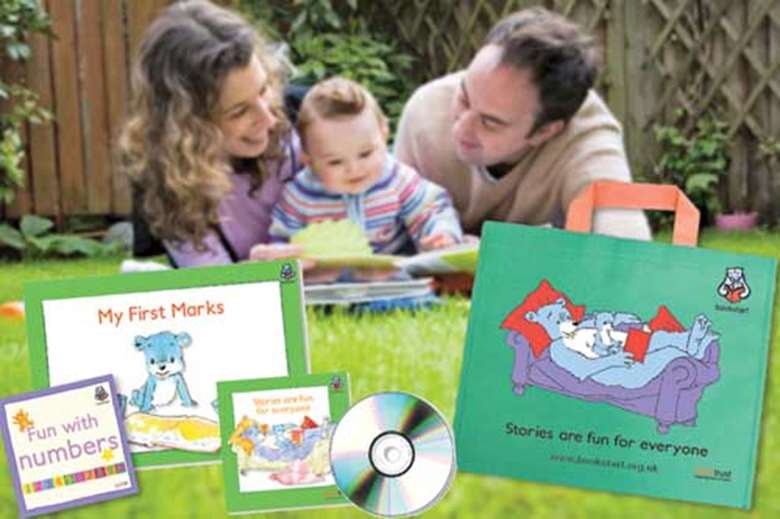Positive Relationships: Working with parents - Let's meet
Ruth Thomson
Friday, July 26, 2013
A project from Bookstart is offering children's centre staff a way to work more closely with disadvantaged families. Ruth Thomson explains.

Disadvantaged families have become more engaged with reading after taking part in Bookstart Corner, a support programme that is also providing some children's centre staff with a route to working more closely with this social group.
'The programme has been a fundamental tool in reaching the most hard-to-reach families in our area,' says one participant. 'It has not only enabled workers to explore the habits of book sharing, songs and rhymes but it has also enabled workers to extend and discuss issues around routine, speech and language.'
Bookstart Corner has grown out of the Bookstart programme, which provides new parents - through their health visitor, children's centre or local library - with two free packs of books for their child during their pre-school years.
Bookstart Corner targets socially or economically disadvantaged families with children aged 12-30 months and offers support through free resources and four home-based sessions with a trained practitioner from a children's centre.
The resources used in the sessions include picture books with information sheets and a DVD on sharing stories, fingers puppets and tips on using story props, rhyme and 'fun with numbers' sheets and a 'my first marks' pad and crayons.
An evaluation of the programme by Sheffield Hallam University has found the vast majority of families liked the resources (98 per cent) and taking part (94 per cent). Practitioners too liked the free pack, which many viewed as a 'fantastic resource', that many families 'really enjoy', 'appreciate and value'.
The programme, concludes the evaluation report, 'exerts a positive influence on a wide range of factors for the families receiving the programme', principally:
- parental encouragement/interaction with their child - the number of mothers/female carers reading every day with their child rose from 54 per cent to 67 per cent
- parent confidence and enjoyment - in the follow-up questionnaire, 94 per cent of parents indicated an increase in confidence
- child engagement and enjoyment
- child interest - the number of parents who felt that their child had a favourite book rose from 66 per cent to 84 per cent.
'Furthermore,' adds the report, 'Bookstart Corner seems to encourage book ownership, promote increased frequency of reading and encourage use of services such as the library and the children's centre.'
Another notable change was the increase in fathers and male carers reading every day to their children, which rose from just 5 per cent to 22 per cent. Also, the rise in mothers and female carers reading was 'sharper if their child was male compared with when the child was female'.
However, further research would be required to say definitively whether 'the programme had had a causal impact on parents and children', say the researchers. 'Responses were not as high as hoped', as parents often failed to complete the questionnaires. The evaluation involved 60 children's centres in 28 local authorities across the North, Midlands, South and London.

NON-THREATENING AND PLAYFUL
'Staff shortages' or a lack of 'appropriate staff', coupled with some parents' reluctance 'to engage', 'literacy issues or language barriers' meant some centres struggled to roll out of the project, or at least as it was originally intended, with four home visits. Some practitioners also found the programme 'time-consuming' and suggested it should be 'more flexible'.
However, for centres with the resources to implement or adapt the programme to suit their needs, the scheme was viewed as a 'lovely relaxed', 'non-threatening and playful' approach to meet and help hard-to-reach families.
'The visits have been a key resource to gain access to families who have been harder to reach, and who have previously refused a home visit,' says one participant.
Around two-fifths (39 per cent) of practitioners targeted families that were accessing the two-year-old offer, which again brought benefits. One participant notes that by linking the programme with the two-year-olds' funding, 'We have been able to engage with families better and form relationships that have led to further targeted work.'
For various practitioners, the programme enabled them to build trust with families and identify their wider problems. One comments, 'At visits you pick up lots of other issues that the parent may need support on and it is an opportunity to earn the families/carers trust and then you can encourage them to attend the centres.'
Another says, 'Through doing the programme I have made speech referrals, completed a CAF, signposted families to seek advice from their health visitor, discussed behaviour issues and sleep routines, and talked about home safety.'
The programme also caused many practitioners to reassess their views of families. While at the outset only 23 per cent believed the family were playing and engaging as a normal part of daily life, that figure had risen to 62 per cent by the end.
MORE INFORMATION
Bookstart Corner, www.bookstart.org.uk/professionals/get-involved/bookstart-corner/.




